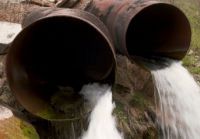

An investigation by the Environment Agency into Severn Trent Water revealed that raw sewage from a blocked sewer had been discharged into a brook near Gloucester, impacting about 1.7km of the watercourse.
The case ended in the water company agreeing an Enforcement Undertaking (EU) with the Environment Agency and giving Gloucestershire Wildlife Trust £327,500.
An EU is a legally binding voluntary agreement made by companies and individuals, and can be accepted where the Environment Agency has reason to believe an offence has been committed. It usually includes a payment to an environmental charity to carry out improvements.
It is available to the Environment Agency as an alternative sanction to prosecution or monetary penalty for dealing with certain environmental offences.
In this case, the Environment Agency had received reports of dead fish on 19 August 2021 at School Lane, Quedgeley, near Gloucester.
An inspection revealed the following dead:
The officer also observed what he believed to be sewage fungus growing in the watercourse for about 1km up to Meerbrook Way. The smell of sewage was strong and the fungus was covering the entire width of the brook.
Further investigations revealed that where the brook exited the A38 at Meerbrook Way, the officer saw what he believed to be a discharge of crude sewage coming out of the bankside into the brook.
An ecological impact assessment concluded that 1.7km of Dimore Brook had been affected and that the vast majority of aquatic animal life had been killed by the sewage discharge.
Between Fisher's Bridge and the Gloucester-Sharpness Canal, the following were observed dead. Approximately:
Environment Agency officers said that Severn Trent had responded to the incident in a timely manner.
Gloucestershire Wildlife Trust is using the funds in a three-year programme to improve various projects close to the impacted area.
Ian Skuse, the Investigating Officer for the West Midlands Environment Agency, said: "Protecting the environment in the West Midlands and taking action against those that damage or threaten this is our utmost priority".
"While we will always take forward prosecutions in the most serious cases, Enforcement Undertakings are an effective enforcement tool to allow companies to put things right and contribute to environmental improvements".
"They allow polluters to correct and restore the harm caused to the environment and prevent repeat incidents by improving their procedures, helping ensure future compliance with environmental requirements".
Sophie Wootton-Lee, Head of External Affairs at Gloucestershire Wildlife Trust, said: "The money received as a result of this incident will be spent close to where it took place, to benefit the wildlife and people who live in and around the wetlands near Gloucester".
"For Gloucestershire Wildlife Trust this is essential - spending the money close to where the damage has occurred, to try and mitigate some of that impact".
Emma Hardy, Minister for Water and Flooding said: "Pollution incidents like this are unacceptable and have a devastating impact on the environment and local communities".
"This Government will never look the other way while water companies pump record levels of sewage into our rivers, lakes and seas".
"We will strengthen regulation, crack down on water companies and begin the work of cleaning up Britain’s waterways. As an immediate step, the Water (Special Measures) Bill will strengthen regulation including new powers to ban the payment of bonuses for polluting water bosses and bring criminal charges against persistent law breakers".
For more information on this subject, see: